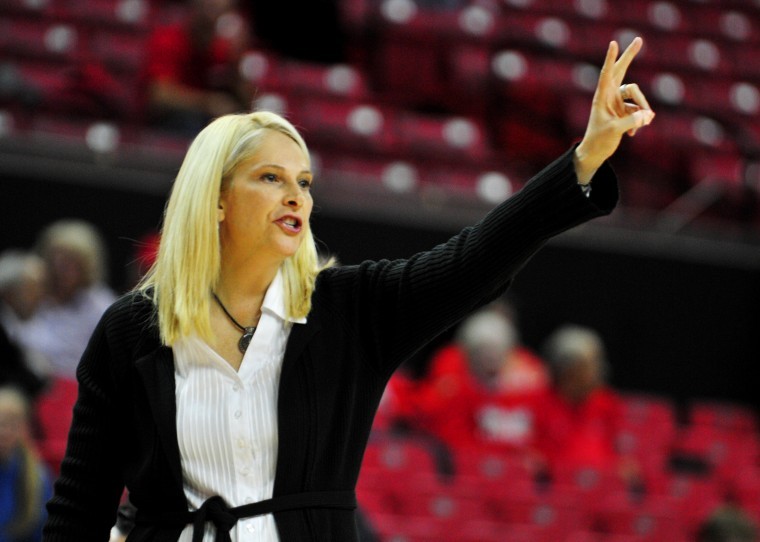
Brenda Frese
Lexie Brown grew increasingly anxious Sunday night. The North Gwinnett High School (Ga.) senior guard had seen the tweets and heard the rumors surrounding the Terps’ potential move to the Big Ten.
She pondered never playing the likes of North Carolina and Duke. She thought about what it would mean to leave arguably her sport’s most dominant conference for what she said was an up-and-coming one. And then, when the anticipation became too much to handle, she called Terrapins women’s basketball coach Brenda Frese.
That’s when the education process began. Frese, who landed Brown’s verbal commitment nearly two-and-a-half years ago, detailed the benefits of a conference switch. She touched upon the improved facilities, the athletic department’s long-term financial stability and the unique opportunities Big Ten competition presents.
That brief conversation was enough to alleviate Brown’s concerns and reinvigorate her excitement to join the Terps next season. And as the university’s move to the Big Ten became official yesterday, such conversations became commonplace for the Terps’ entire coaching staff. Recruits had questions, and coaches needed to provide answers.
“At the end of the day, it comes down to this university,” Frese said. “It comes down to Maryland. It comes down to relationships. It’ll be our jobs as coaches to sell that with recruits.”
For Frese and other accomplished Terps coaches — men’s basketball’s Mark Turgeon and men’s soccer’s Sasho Cirovski, among others — recruiting in a new conference is that simple. Why drastically change your approach when you’ve already established a formula for success?
But even the university’s most skilled recruiters will likely have to adjust to a simple reality: The conference change will impact their recruiting base.
Given the geographic makeup of the ACC, the Terps had a built-in network with certain Southern recruiting hotbeds. Coaches could sell top-tier athletes in South Carolina, Georgia or Florida on the idea of playing annual games near their hometowns.
Now, recruiting the South could become a bit more difficult — especially for football coach Randy Edsall’s staff.
“When you look at going into the deep South and whatnot, especially football, Maryland’s not going to be able to have that as a primary area anymore,” said Keith Cavanaugh, editor in chief of the university’s Rivals.com affiliate, TerrapinTimes.com. “Maryland’s not going to be able to pull kids from the South every year anymore.”
Cavanaugh said Frese and Turgeon won’t need to fret over losing the South because they’ve already proven they can recruit on the national level. Their staffs have strong ties to nearly every corner of the country, and will be able to weather the potential setbacks inherent in the conference switch.
Edsall, however, will likely need to establish more of a recruiting presence in the Midwest — a far less fertile region for high school talent — to offset the potential commitments he could lose in the South. Cavanaugh said Edsall will have to begin exploring major Midwest cities such as Cincinnati, Kansas City, Mo., and Detroit, among others, to compete in the Big Ten.
Of course, no conference realignment should impact Edsall’s emphasis on recruiting local talent. Twelve of football’s 17 commitments in the Class of 2013 are from the Delaware-Maryland-Washington area, none of whom have publicly voiced apprehensions over the move to the Big Ten.
“I’m excited about the opportunity,” said Milan Collins, Terps-committed senior quarterback and safety at Forestville’s Bishop McNamara High School. “The Big Ten presents a physical presence. The offensive line is the main power there, but this won’t come into effect until my sophomore year. So I’m ready to play in both conferences and just compete.”
The majority of Terps recruits seem to share Collins’ sentiments, Cavanaugh said. No recruit in any sport had decommitted as of last night, and Terps coaches spent much of the day trying to alleviate any of their future players’ potential concerns.
Cirovski talked with recruits for about an hour before yesterday’s news conference, expressing confidence in the administration’s decision to leave the ACC after 59 years. Baseball coach John Szefc plans to take a similar approach, telling players how the Big Ten contract will provide enough money to upgrade the program’s facilities.
Frese, meanwhile, went as far as telling recruits that she would make sure they could play their “ACC dream opponents” in nonconference games once the Terps join the Big Ten.
But none of those selling points were a deciding factor for Brown. The U.S. women’s Under-18 national team member said she fell in love with the school, not the opponents it plays. No conference change was going to break that bond.
It just took a little education for her to reach that realization.
“I was a little upset at first, but now I’m excited,” Brown said. “Now we can just take over the Big Ten like we took over the ACC.”
Senior staff writer Daniel Gallen contributed to this article.
sportsdbk@gmail.com



